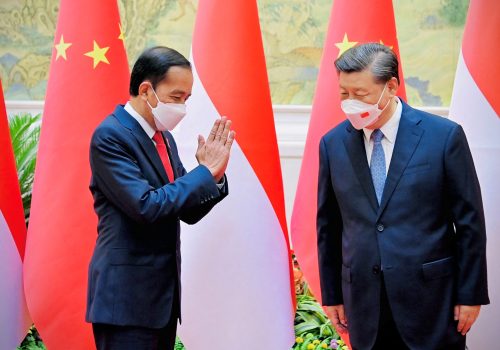Economic growth in rich countries is slowing down: Europe is heading for a recession, and there’s plenty of debate about whether the United States will face one too (and if so, when). For most countries, the consequences will likely be a mix of higher unemployment, lower wages and incomes, and more business closures.
Recessions can often be traced back to declining consumer confidence. When consumers hear gross domestic product (GDP) growth is shrinking, they lose confidence and spend less—which hurts businesses that then cut wages and lay off employees, most often low-income workers. News media announcing recessions based on their own arbitrary definitions can make consumer confidence fall even faster, an illustration of the growth imperative in action. Low confidence traps consumers in a loop: They need to spend money in order for GDP to grow, but they also need to be confident in the country’s GDP growth before spending money.
Since the end of World War II, boosting growth has been the main national policy of almost every country. But this singular focus on GDP, and its role in shaping economic and political decisions, is outdated. GDP only measures market transactions; it does not factor in a country’s wellbeing or social progress.
It is time to stop talking about GDP growth as the only metric that matters. Developed countries, in particular, should prioritize previously subordinated goals—such as climate resilience, health care access, education, happiness, life satisfaction, or the reduction of inequality—over GDP growth. This requires a deep narrative change in most Western societies from talking about economic progress to focusing on human progress. In making that shift, economists and political scientists will need to define concepts like wellbeing, happiness, and human development—and the encompassing concept of prosperity.
Everything and nothing
While he was a US presidential candidate, former Senator Robert F. Kennedy once said that gross national product (GNP), a metric similar to the GDP, ”measures everything in short, except that which makes life worthwhile.” He explained how GNP fails to account for a country’s noneconomic indicators such as children’s health, education quality, happiness, and public-official integrity. Yet more than fifty years later, prioritizing economic growth remains the main orthodoxy among national leaders.
Countries facing challenges like high inflation, growing income inequality, a shortage of teachers, or even collapsing health care systems should question whether GDP growth is really what to strive for. Instead, they should set their sights on prosperity (which, tracing the word back to its Latin roots, means “according to one’s hope”).
Countries should start by strengthening their democracies, a key precursor to prosperity. In 2021, the percentage of people living in a democracy dropped well below 50 percent. “We must demonstrate that democracies can still deliver for our people,” US President Joe Biden told the 2021 Munich Security Conference.
At the same time, countries should center their policies around the needs of their citizens. For example, in 2005, the Latvian parliament switched focus to prosperity when it adopted a human-centered growth approach, setting long-term goals on education, research and development, innovation, health, foreign diplomacy, and the increase of their citizens’ self-worth, among others. Latvia’s model puts people first: Citizens’ interests, desires, and activities are the priorities and serve as the guidepost to any government action, and in its thirty years of post-Soviet existence, the country has established itself as a stable consolidated democracy. Today, on the Organization for Economic Co-operation and Development’s Better Life Index, Latvia is ranked close to South Korea and Japan, two countries with much higher GDP per capita.
Not one-size fits all—yet
However, it would be a misstep to impose this switch in focus from GDP growth to prosperity on developing countries. GDP growth may no longer be as relevant to the United States and the West, but economic growth is still the most powerful instrument for reducing poverty in developing countries. There is overwhelming evidence that rapid and sustained growth is essential to making fast improvements to the quality of life in developing countries.
But for developing countries, solely focusing on growth is counterproductive. Income inequality holds back long-term growth, and lessening inequality should be a priority in any development plan. Thus, developing countries should prioritize making their growth equitable and sustainable. Decisionmakers should craft policies that help people, especially the poor and marginalized, take full advantage of the opportunities created by economic growth. This includes policies that improve financial inclusion, improve labor-market inclusion, and remove gender inequalities.
In addition to GDP growth, a multitude of metrics have been created to help decisionmakers map the best paths to development for their countries, with benchmarks to track their progress. For example, since 1990, the United Nations Development Program (UNDP) Human Development Index has promoted an assessment model that considers people and their capabilities as the ultimate criteria for assessing a country’s development—while economic growth is a factor, it is not the lone criteria.
Top twenty countries as ranked according to development and prosperity indexes
Above are the top twenty countries ranked against various development and prosperity measurements. This largely correlates with GDP-based rankings because indexes like the UNDP Human Development Index or the Legatum Prosperity Index use GDP per capita as a factor in their rankings. No advocate of refocusing countries away from GDP growth denies that growth propelled countries to this level of prosperity. But it doesn’t matter which country ranks first or even twentieth; rather these indexes exist for countries in the seventies, eighties, nineties, and beyond to climb upward. Decisionmakers should use these indexes to identify the most important goals that should be part of their sustainable long-term growth plans and to keep track of progress on what matters: human development and the prosperity that comes with it.
On the other hand, developed countries need to entirely pivot their focus: They must graduate from the growth imperative and consider how best to create prosperity in the forms of peace and security, business opportunities, climate action, improved equality, social safety nets, stronger democracy, and freedom.
Joseph Lemoine is the deputy director of the Atlantic Council’s Freedom and Prosperity Center.
Further reading
Thu, Sep 22, 2022
Multilateralism needs an overhaul. Here’s where to start.
New Atlanticist By Yomna Gaafar
The world is growing more volatile by the day—but leaders are acting within a system ill-equipped to handle the moment.
Thu, Aug 18, 2022
There’s more to China’s new Global Development Initiative than meets the eye
New Atlanticist By Joseph Lemoine, Yomna Gaafar
A growing Chinese presence in multilateral organizations could give Beijing undue influence over the developing world.
Wed, Jun 1, 2022
Do countries need freedom to achieve prosperity?
Report By Dan Negrea, Joseph Lemoine, Matthew Kroenig, Joel Kesselbrenner
The Freedom Index and Prosperity Index are two separate indexes that rank one hundred and seventy-four countries around the world according to their levels of freedom and prosperity.
Image: People in a shopping street. Photo via Reuters.



